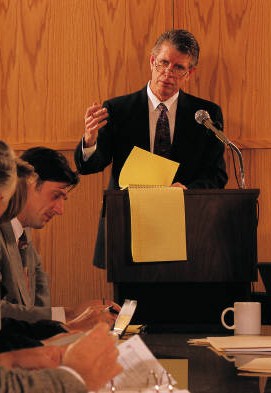In Mr. Smith Goes to Washington, the naïve Mr. Smith yields the Senate floor out of courtesy to a colleague, In doing so he loses his ability to debate on his legislation to prevent graft and corruption, Mr. Smith learned the hard way about the importance of knowing procedural rules. Officers and members of boards and and associations need to know the rules of order to achieve their goals and help their enterprises succeed. Our expertise includes:
- Meeting and Session Governance Services
- Presiding Officer Services
- Delegate Convention or Assembly Services
- Strategic Procedural Planning Services
- Bylaw Drafting, Review, and Revision Services
- Written Opinions Services
- Training Programs
Have you been a member of a local assembly such as a city council, school committee, or organization and were denied permission to place an item on the agenda? Chances are the denial was wrong.
In Congress, we hear about agendas such as gun control versus Second Amendment rights, immigration reform versus controlling illegal immigration and border security. These appear as an “agenda” for competing parties in Congress, and they become the agenda for the Congress and no one is allowed to add something to it. Who sets these agendas and how is that they can prevent additions? The Congressional leaders and their hold on power, of course.
Unfortunately, many leaders in local assemblies such as city councils and school committees and even private associations have come to believe that the leadership of the body or association has some inherent right to set the agenda for meetings without any input from members. Nothing could be further from the truth.
Congressional leaders control the agenda because legislative rules give them appointing authority for committees. Appointments lead to additional income and prestige for those that get appointed as chairmen or to certain committees. If appointees wish to maintain their positions, it’s in their best interest to do as the leadership directs lest they lose their position.
For local assemblies money and prestige play little to no role in setting an agenda. In fact the first place to look for the answer as to who sets agendas is federal or state laws. These are typically silent on such matters. Articles of incorporation, bylaws or other rules establish how an assembly establishes an agenda for a meeting or conference and depends in large part on the type and size of the meeting.
See the article on Rules for Establishing Agendas and Orders of Business for information on rules for establishing agendas. It’s also important to understand what an agenda item is. For information on agenda items you may want to take a look at the article What is an agenda item?

© 2011-2013 Call to Order Parlimentarian Service
Why can't I put an item on the agenda?


